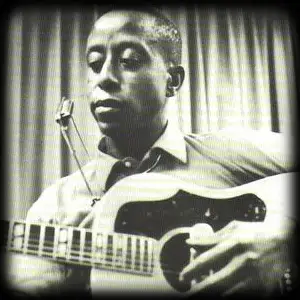DOCTOR ROSS
 Doctor Ross ‘The Harmonica Boss’ got his stage name from his habit of carrying his harps in a black bag like a medical man. An extremely unorthodox musician, Dr. Ross spent most of his career as a one-man-band in the spirit of Daddy Stovepipe and Joe Hill Louis. He started out playing near his Delta home before spending decades in Detroit before he came to some kind of fame on the Festival circuit in the 70s.
Doctor Ross ‘The Harmonica Boss’ got his stage name from his habit of carrying his harps in a black bag like a medical man. An extremely unorthodox musician, Dr. Ross spent most of his career as a one-man-band in the spirit of Daddy Stovepipe and Joe Hill Louis. He started out playing near his Delta home before spending decades in Detroit before he came to some kind of fame on the Festival circuit in the 70s.
TV performance for the American Folk Blues Festival in 1965.
Also in 1965, Dr. Ross travelled to Europe with the American Blues Festival and cut the ‘Flying Eagle’ album for the Mike Vernon‘s Blue Horizon label in London, their first ever release. The Doctor was a popular act in Europe and was a very frequent visitor over the years. In 1971, Fortune collected their back-catalogue of his recordings on ‘Dr. Ross the Harmonica Boss’ where he was backed by The Disciples or the Messengers of Soul. In 1972 he cut a live album in Germany, then again at the Montreux Festival and yet again in 1974 in London. His final cut was a live album at The Burnley Blues Festival in England in 1991. While he was never a pioneering artist, Dr. Ross made a big impression on anyone who saw him, and he was much missed on the Festival circuit when he passed away in Flint, Michigan in 1993.